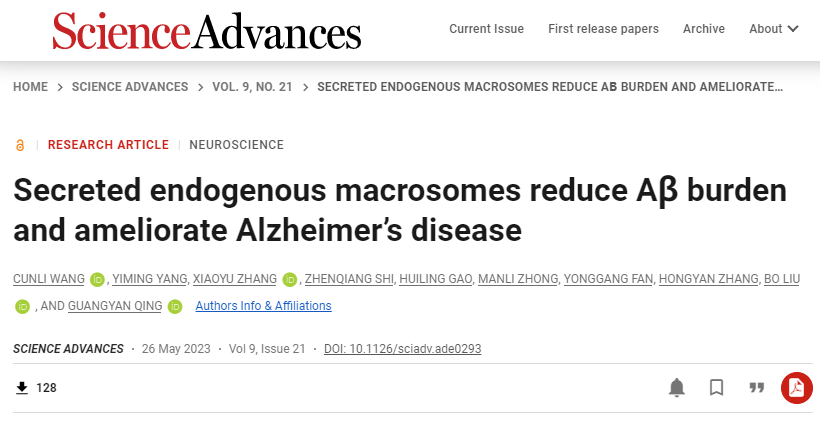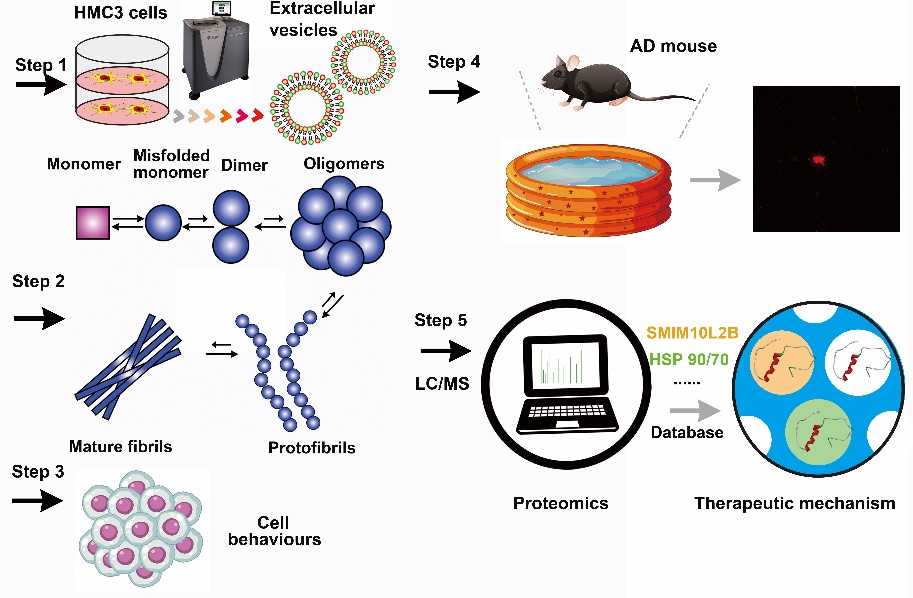Recently, Professor Liu Bo from the School of Biomedical Engineering at Dalian University of Technology's Faculty of Medicine, in collaboration with senior researcher Qing Guangyan from the Dalian Institute of Chemical Physics of the Chinese Academy of Sciences, and Prof. Gao Huiling from Northeastern University, proposed a new perspective for treating Alzheimer's disease. Their findings, titled "Secreted endogenous macrosomes reduce Aβ burden and ameliorate Alzheimer’s disease," were published in the journal Science Advances (DOI: 10.1126/sciadv.ade0293).

Alzheimer's Disease (AD) is the most common neurodegenerative disease and one of the biggest public health challenges worldwide. However, current treatments for AD have been stymied due to poor drug target inhibition, the inability to cross the blood-brain barrier, and potential adverse immune responses. This has led to a desperate need for new therapies to delay the onset or alter the progression of Alzheimer's. The main pathological hallmarks of AD are extracellular β-amyloid (Aβ) plaque deposits and intracellular Tau protein hyperphosphorylation resulting in neurofibrillary tangles, with Aβ aggregation considered one of the primary causes.
In recent years, extracellular vesicles have garnered attention for their ability to cross the blood-brain barrier and not induce inflammatory reactions. Therapeutic approaches based on these vesicles are emerging. This study investigated vesicles released from human microglial cells to inhibit Aβ peptide aggregation as a treatment for AD. The researchers first isolated vesicles of varying sizes released by human microglial cells, including small extracellular vesicles and microvesicles. It was found that the smaller vesicles did not inhibit Aβ aggregation, while the microvesicles strongly inhibited it. Further research showed that compared to the smaller vesicles, microvesicles reduced Aβ plaques in the brains of AD mice, improving their cognitive abilities and reducing neuroinflammation. This suggested that microvesicles could be a potential drug for treating AD. The study revealed that, compared to smaller vesicles, microvesicles concentrated various inhibitors of Aβ aggregation. Therefore, the findings suggest that these microvesicles act as a platform combining various Aβ inhibitors, which can collaboratively treat AD, thus offering a new perspective for AD treatment.

Wang Cunli, a doctoral student (enrolling in 2020) from the School of Biomedical Engineering at Dalian University of Technology's Faculty of Medicine, is the first author of the paper. Professor Liu Bo from the same school and senior researcher Qing Guangyan from Dalian Institute of Chemical Physics, Chinese Academy of Sciences are the corresponding authors. The School of Biomedical Engineering at Dalian University of Technology's Faculty of Medicine is the primary institution credited for this paper. The research was funded by the National Natural Science Foundation of China (NSFC No. 32071252).

